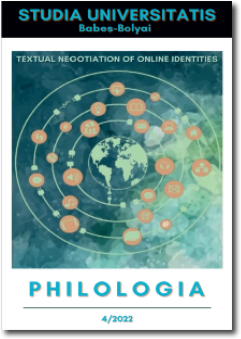MOYENS D’EXPRESSION DE LA POSSESSION INALIÉNABLE DANS LES CONSTRUCTIONS VERBALES AVEC DES NOMS DE PARTIES DU CORPS (DOMAINE FRANÇAIS-ROUMAIN)
MEANS OF EXPRESSING INALIENABLE POSSESSION IN VERB STRUCTURES WITH BODY PART NOUNS (FRENCH AND ROMANIAN)
Author(s): Daniela Dincă, Ilona BădescuSubject(s): Syntax, Comparative Linguistics
Published by: Studia Universitatis Babes-Bolyai
Keywords: possessive dative; inalienable possession; noun denoting body parts; possessor; syntactic function;
Summary/Abstract: Means of Expressing Inalienable Possession in Verb Structures with Body Part Nouns (French and Romanian). Departing from the verb structures with the possessive dative that express the inalienable possession between a noun that names body parts (Nbp) and its possessor in Romanian (Ro: I-a rupt gâtul. / Fr. Il lui a rompu le cou), we set out to establish a typology of verb structures consisting of two subclasses: (1) Verbs that place the possessor in the possessive dative and the Nbp in the accusative (direct object); (2) verbs that place the Nbp as an adverbial modifier and the possessor in the possessive dative, possessive accusative or genitive. The second objective of our study is to carry out a comparative-based analysis of the ways of expressing the inalienable possession in the verb structures of the two Romance languages, constructed with the lexeme Fr. cou, gorge / Ro gât, to highlight the similarities and differences in this relationship-type structures specific for the two Romance languages. For the analysis we resorted to an authentic corpus, complied from real-life examples sampled from journalistic texts (Corpus Leipzig, online newspapers), supplemented by electronic dictionaries (TLFi, CNTRL, Dex online). Given the richness of verb structures and the considerable number of differences between the two languages, we systematised our analysis in several stages: (1) identifying the verb structures built with the possessive dative; (2) establishing a verb structure typology according to the syntactic function assigned to the Nbp (subject, direct object, indirect object, adverbial modifier) and its possessor (possessive dative, possessive accusative, genitive); (3) highlighting the similarities and differences between the two languages in terms of the construction of the inalienable possession relationship between the Nbp and its possessor.
Journal: Studia Universitatis Babes-Bolyai - Philologia
- Issue Year: 67/2022
- Issue No: 4
- Page Range: 335-355
- Page Count: 21
- Language: French

